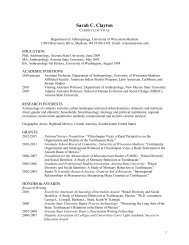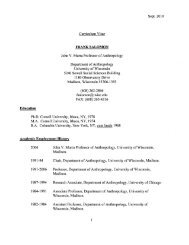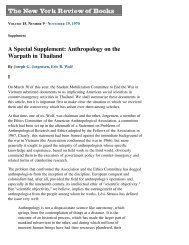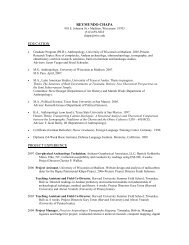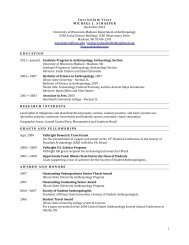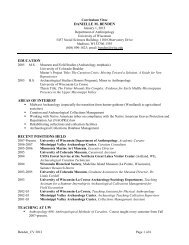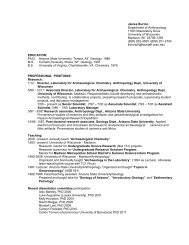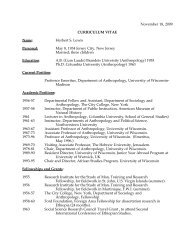Boas, Darwin, Science, and Anthropology1 - Department of ...
Boas, Darwin, Science, and Anthropology1 - Department of ...
Boas, Darwin, Science, and Anthropology1 - Department of ...
Create successful ePaper yourself
Turn your PDF publications into a flip-book with our unique Google optimized e-Paper software.
392 F current anthropology Volume 42, Number 3, June 2001<br />
basis <strong>and</strong> the forms in which they find expression<br />
may be studied. Thus the solidarity <strong>of</strong> social groups<br />
<strong>and</strong> their antagonism toward the outsider; the forms<br />
<strong>and</strong> motives for coordination <strong>and</strong> subordination; imitation<br />
<strong>of</strong>, <strong>and</strong> resistance to, outside influences; competition<br />
between individuals <strong>and</strong> between groups; division<br />
<strong>of</strong> labor; amalgamation <strong>and</strong> segregation;<br />
attitudes toward the supernatural. . . . From these<br />
studies a cultural morphology may be constructed<br />
<strong>and</strong> a social psychology developed, based on the variety<br />
<strong>of</strong> manifestations <strong>of</strong> these categories.<br />
We can illustrate <strong>Boas</strong>’s idea <strong>of</strong> social tendencies with<br />
the matter <strong>of</strong> ethnicity <strong>and</strong> ethnonationalism at the turn<br />
<strong>of</strong> the 21st century. Few predictions in social science<br />
seemed more secure 50 years ago than the one that foresaw<br />
the end <strong>of</strong> “parochial nationalisms” as the result <strong>of</strong><br />
“modernization.” (Even <strong>Boas</strong> believed this.) And yet today<br />
ethnicity is one <strong>of</strong> the most powerful social <strong>and</strong> political<br />
forces throughout the world. By now we underst<strong>and</strong><br />
a great deal about ethnicity <strong>and</strong> ethnonationalism:<br />
their origins, the passions they induce, the ways in which<br />
innovators <strong>and</strong> entrepreneurs foment them, how followers<br />
react to their messages, <strong>and</strong> the reactions <strong>of</strong> government<br />
<strong>of</strong>ficials <strong>and</strong> members <strong>of</strong> competing ethnic groups<br />
to the ethnic aspirations <strong>of</strong> others. But we have no reliable<br />
way <strong>of</strong> predicting which movements will “succeed”<br />
<strong>and</strong> which will “fail,” how long ethnonationalism<br />
will continue to grow in popularity <strong>and</strong> importance, or<br />
what new general trends will arise in the future. We can<br />
underst<strong>and</strong> the processes, but specific future developments<br />
depend upon particular actions <strong>and</strong> events that<br />
we cannot foresee.<br />
Joshua Fishman, writing <strong>of</strong> the growing global importance<br />
<strong>of</strong> English as an international language (1998–99),<br />
cautions against the assumption that this predominance<br />
will necessarily continue to grow. Other languages are<br />
<strong>of</strong> increasing regional importance, there may be growing<br />
resistance to English, <strong>and</strong> shifts in political <strong>and</strong> economic<br />
fortunes that we cannot now imagine will produce<br />
more complex outcomes. Just as we cannot predict<br />
future biological evolution despite our great knowledge<br />
<strong>of</strong> genetics <strong>and</strong> ecology, so we cannot predict human<br />
events. 29<br />
In 1930 <strong>Boas</strong> cautiously attempted a few generalizations<br />
about the development <strong>of</strong> such complex systems<br />
as “modern science,” art styles, <strong>and</strong> metaphysical <strong>and</strong><br />
religious systems <strong>of</strong> knowledge. “Probably all that can<br />
be said is that as long as a certain trend <strong>of</strong> activity or<br />
thought persists it will proceed, on the lines laid down,<br />
toward an increasing intensity or complexity. Nothing<br />
29. Despite the theoretical <strong>and</strong> practical knowledge <strong>and</strong> the technological<br />
marvels <strong>of</strong> meteorology, the powerful storms that caused<br />
havoc in France in the winter <strong>of</strong> 1999–2000 were totally unanticipated,<br />
while the hurricane that hit North Carolina was confidently<br />
expected to blow out to sea. The physical principles were understood,<br />
there was no lack <strong>of</strong> data, but chance <strong>and</strong> unpredictability<br />
are ineradicable features <strong>of</strong> weather systems. This is surely the case<br />
in the complex world <strong>of</strong> culture, society, <strong>and</strong> history as well.<br />
can be predicted in regard to detailed style <strong>of</strong> development,<br />
the duration <strong>of</strong> the trend, <strong>and</strong> the new direction<br />
that action <strong>and</strong> thought may take after its termination”<br />
(1930:110). This is not a trivial observation but a sound<br />
generalization about complex systems. We witness increasing<br />
intensity <strong>and</strong> complexity occurring all the time,<br />
in all sorts <strong>of</strong> systems. The organization <strong>of</strong> American<br />
football has become extraordinarily complex, with the<br />
growth <strong>of</strong> specialization <strong>of</strong> tasks <strong>and</strong> skill that now requires<br />
greatly exp<strong>and</strong>ed coaching staffs to deal with all<br />
the types <strong>of</strong> positions. The invention <strong>of</strong> the skateboard<br />
in the late 20th century led to entirely new skills <strong>and</strong><br />
activities, followed by organizations <strong>and</strong> forms <strong>of</strong> display<br />
<strong>and</strong> competition. The growing popularity <strong>of</strong> running in<br />
the United States has given rise to books, magazines,<br />
theoreticians, medical specialists, trainers, <strong>and</strong> the manufacture<br />
<strong>of</strong> special shoes for every conceivable track <strong>and</strong><br />
condition. Or we may consider the elaboration <strong>of</strong> tax<br />
codes <strong>and</strong> the preparation <strong>of</strong> tenure cases in academia<br />
<strong>and</strong> the organization <strong>and</strong> elaboration <strong>of</strong> clubs <strong>and</strong> networks<br />
for collectors—even before the establishment <strong>of</strong><br />
the worldwide web.<br />
Nor is this true only in “late capitalist society.” It is<br />
a general tendency. The extraordinary elaboration <strong>and</strong><br />
involution <strong>of</strong> many Australian marriage <strong>and</strong> kinship systems<br />
seem to represent the working out <strong>of</strong> the rules <strong>of</strong><br />
the game <strong>and</strong> the interests <strong>of</strong> the people (Kroeber 1938).<br />
So does the development <strong>of</strong> Jewish law <strong>and</strong> rabbinical<br />
commentary, in a very different society.<br />
We cannot predict the most immediate developments,<br />
let alone those in the remote future. We have no way <strong>of</strong><br />
knowing when new interests <strong>and</strong> activities will arise,<br />
how long any will last, or when institutions may be drastically<br />
changed. Not only can we not predict major political<br />
shifts (such as the sudden collapse <strong>of</strong> regimes in<br />
Indonesia <strong>and</strong> Serbia in 2000), we cannot reliably guess<br />
at the implications <strong>of</strong> the electronics <strong>and</strong> information<br />
revolution going on at the moment, one whose current<br />
form was not dreamt <strong>of</strong> two decades ago.<br />
Conclusions<br />
Franz <strong>Boas</strong> was a “historicist,” deeply aware <strong>of</strong> the historically<br />
determined nature <strong>of</strong> everything in the cultural<br />
<strong>and</strong> natural worlds, but he was not a “particularist,” if<br />
that means someone unable to generalize. He rejected<br />
all simple determinisms <strong>and</strong> conjectured “laws” <strong>and</strong><br />
questioned alike the “gr<strong>and</strong> narratives” <strong>of</strong> Spencerian<br />
evolutionists, British, German, <strong>and</strong> Austrian diffusionists,<br />
Radcliffe-Brownian structural-functionalists, <strong>and</strong><br />
environmental, psychological, <strong>and</strong> economic determinists,<br />
but he was in search <strong>of</strong> generalizations about<br />
culture.<br />
<strong>Boas</strong>’s approach to underst<strong>and</strong>ing <strong>and</strong> explanation in<br />
anthropology parallels that which such thinkers as Ernst<br />
Mayr <strong>and</strong> Elliott Sober recognize as appropriate—even<br />
necessary—for many aspects <strong>of</strong> biology <strong>and</strong> some other<br />
natural sciences. It was <strong>Boas</strong>, rather than his detractors,



